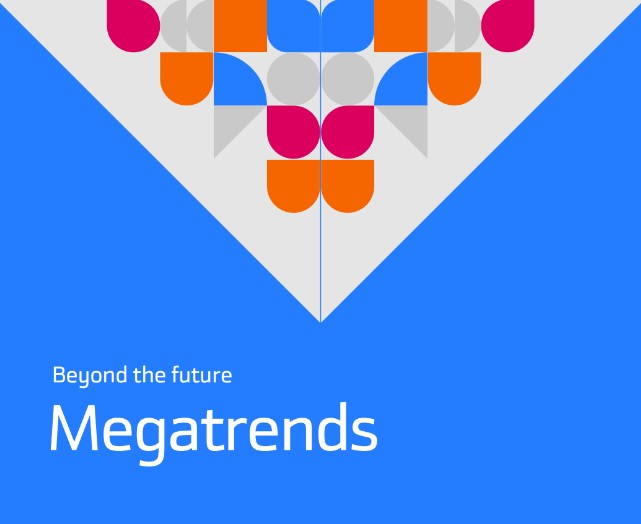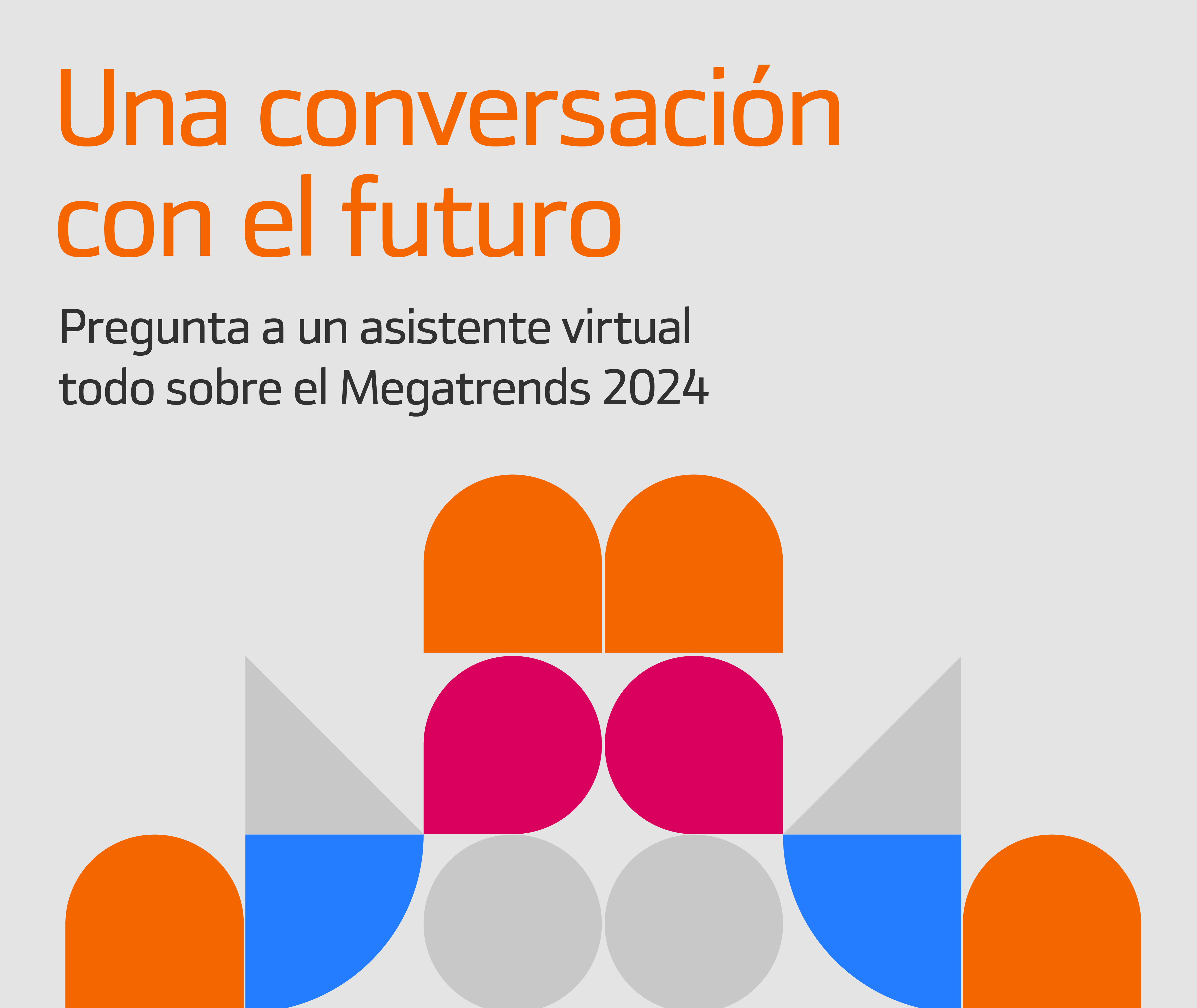We have created 10 chats with GPT based on all the historical knowledge of the Foundation.
Have you tried them yet?
Within the report, under each megatrend, you can find the GPT icon to learn more.

ChatGPT
We have created 10 chats with GPT based on all the historical knowledge of the Foundation.
Have you tried them yet?
Within the report, under each megatrend, you can find the GPT icon to learn more.


Beyond generative AI
Generative artificial intelligence will be the key to a new hybrid workforce, in which humans and AI will work side by side. They will most likely do so in specialized equipment with specialized models, beyond the generalists that emerged in 2023. The integration of the roles of humans and machines will transform professions. All this, of course, with its corresponding ethical questions, which will have to be resolved.
to (re)create our world
Generative artificial intelligence has passed like a cyclone over the plans of large companies to develop their metaverses. Does this mean that virtual reality is dead? Not at all: its applications in fields such as mental health are promising and may enhance the development of this technology for future mass use. Augmented reality seems, for the moment, the closest bet for everyday uses according to experts.


From the smart city to the wise city
The intense advances in data collection and processing will now lead to great advances in cities that citizens will experience first-hand. The challenge will be to turn the smart city into a wise city, which knows how to take advantage of all this innovation to be more sustainable (and easier for the urbanite to live in) and manage the tensions that could arise with the rural world due to competition for resources.
to cure the incurable
Advances in genome sequencing, gene editing and nanotechnology, together with technologies such as CRISPR (the first therapy already approved for the EU) and RNA therapies will help medicine to acquire a new superpower: that of taking full advantage of genetic and molecular data, which will revolutionize the current paradigm of treatment and prevention of diseases. with treatments designed to the millimeter for the patient’s genetic profile.
Reducing errors, improving productivity, together with the development of better and cheaper care will result in more effective and safer treatments for diseases that were previously incurable.


The future of talent
What impact will an increasingly personalized education thanks to artificial intelligence have? How will technology in education affect the talent of the future? What will professional careers be like?
The application of technology to education will have a profound impact on increasingly personalised, accessible, decentralised and cradle-to-retirement training itineraries, preparing the talent of the future to adapt to an increasingly dynamic professional career.
with today's world
Today it seems clear that sustainability affects everything, but the reality is that we have experienced an evolution from the mere protection of the environment to a central conception of sustainability even in all aspects of our lives. Today, concepts such as the circular economy help us to build a better world in which progress and social equity fit.
Alongside the evolution of technology (to produce and store clean technologies that help us combat our carbon footprint, to discover and use new materials, for new ways of producing food for all…) new challenges arise: what cultural changes must accompany these developments in order to really help us develop a more sustainable world? How will we solve the dilemma between sustainability and costs? How will we relate to each other and also to the planet?


to improve the Earth
The commercialization of space brings us closer to becoming a multiplanetary species. Until that goal is reached, a large number of innovations developed to reach Mars, find life on other planets or colonize the moon could improve life on Earth. From clean and powerful propulsion technologies to space labs to enhanced data processing, many answers to Earth challenges will come from the conquest of space.
to better understand the brain
Evolutions in neuroscience have led to a greater understanding of the brain that has allowed us to develop solutions that today allow us to improve health, well-being and human performance from different medical and technological perspectives.
Examples of this evolution include the development of brain-computer interfaces (BCIs), which allow people to control external devices with their thoughts, or the use of neurotechnology to treat neurological diseases, such as Parkinson’s disease and epilepsy.
The evolution of these advances will lead us to increase our human capacities beyond the therapeutic world and will focus on risks and opportunities that we must begin to face now: cybersecurity or inequality will reach a new dimension as our species evolves towards a greater knowledge of our brain and body.


in transformation
The race to get ahead of the future of digital security is vitally important to ensure social progress. The great advances in these security technologies, which have been driven by the increase in digitalization and connectivity, have also brought with them equally extensive advances in hacking techniques and digital crime.
Some areas in which much progress has been made in cybersecurity are: biometrics, which allows people to be identified more securely and accurately, such as facial recognition or fingerprint; blockchain, which has revolutionized the way data is stored and shared; IoT, as connected devices are more vulnerable; AI, used for the detection and prevention of cyberattacks; or the development of security solutions for mobile devices, which are increasingly used to access confidential data.
In addition, quantum computing poses new challenges for cybersecurity, as it could break current encryption systems. Quantum cryptography is working in this quantum field, which offers greater security than current encryption systems, but whose development is still in an early stage.
to hybrid computing
Quantum computing, in particular, has evolved from a theoretical research field to a reality with potential commercial applications. In 2023, a major milestone in quantum computing has occurred with the development of a 1,112-qubit quantum chip by IBM.
Meanwhile, quantum communications are also progressing rapidly. In 2022, the first quantum data transmission was carried out over a 44-kilometer fiber optic cable.
Quantum sensors are also starting to be used in commercial applications. In 2021, it was announced that a quantum temperature sensor that is 100 times more sensitive than traditional sensors would be commercialized.
Quantum computing is expected to become a mainstream business reality in the coming years, with quantum communications and sensors being used in a wide range of applications. Until then, the technology will face its own challenges, such as reducing and correcting errors, and opportunities, such as its interaction with artificial intelligence

Do you have any questions?
Do you want to always be up to date?
Do you have any questions?